 W
WThe 2011 Albanian opposition demonstrations were a series of anti-government protests in cities around Albania following 18 months of political conflict over alleged electoral fraud by the opposition. A video surfaced which portrayed the deputy prime minister arranging a corrupt deal with the minister of economy. The public outcry over the video resulted in the resignation of the deputy prime minister. A demonstration was called by parliamentary opposition parties, which include the Socialist Party and the Unity for Human Rights Party. These were called on 21 January in order to protest the alleged corruption of the Albanian government as well as widespread unemployment and poverty in the country.
 W
WThe 2010–2012 Algerian protests were a series of protests taking place throughout Algeria, lasting from 28 December 2010 to early 2012. The protests had been inspired by similar protests across the Middle East and North Africa. Causes cited by the protesters included unemployment, the lack of housing, food-price inflation, corruption, restrictions on freedom of speech and poor living conditions. While localized protests were already commonplace over previous years, extending into December 2010, an unprecedented wave of simultaneous protests and riots, sparked by sudden rises in staple food prices, erupted all over the country starting in January 2011. These were quelled by government measures to lower food prices, but were followed by a wave of self-immolations, most of them in front of government buildings. Opposition parties, unions, and human rights organisations then began to hold weekly demonstrations, despite these being illegal without government permission under the ongoing state of emergency; the government suppressed these demonstrations as far as possible, but in late February yielded to pressure and lifted the state of emergency. Meanwhile, protests by unemployed youth, typically citing unemployment, hogra (oppression), and infrastructure problems, resumed, occurring almost daily in towns scattered all over the country.
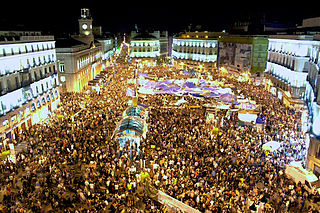 W
WThe anti-austerity movement in Spain, also referred to as the 15-M Movement, and the Indignados Movement, was a series of protests, demonstrations, and occupations against austerity policies in Spain that began around the local and regional elections of 2011 and 2012. First starting on 15 May 2011, many of the subsequent demonstrations spread through various social networks such as Real Democracy NOW and Youth Without a Future.
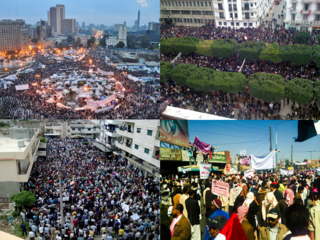 W
WThe Arab Spring was a series of anti-government protests, uprisings, and armed rebellions that spread across much of the Arab world in the early 2010s. It began in response to corruption and economic stagnation and was influenced by the Tunisian Revolution. From Tunisia, the protests then spread to five other countries: Libya, Egypt, Yemen, Syria, and Bahrain, where either the ruler was deposed or major uprisings and social violence occurred including riots, civil wars, or insurgencies. Sustained street demonstrations took place in Morocco, Iraq, Algeria, Iranian Khuzestan, Lebanon, Jordan, Kuwait, Oman, and Sudan. Minor protests took place in Djibouti, Mauritania, Palestine, Saudi Arabia, and the Moroccan-occupied Western Sahara. A major slogan of the demonstrators in the Arab world is ash-shaʻb yurīd isqāṭ an-niẓām!.
 W
WThe 2011 Armenian protests were a series of civil demonstrations aimed at provoking political reforms and concessions from both the government of Armenia and the civic government of Yerevan, its capital and largest city. Protesters demanded President Serzh Sargsyan release political prisoners, prosecute those responsible for the deaths of opposition activists after the 2008 presidential election and institute democratic and socioeconomic reforms, including the right to organise in Freedom Square in downtown Yerevan. They also protested against Yerevan Mayor Karen Karapetyan for banning the opposition from Freedom Square and barring vendors and traders from the city streets. The opposition bloc Armenian National Congress, which has played a major role in organising and leading the demonstrations, had also called for a snap election and the resignation of the government.
 W
WThe 2011 Bahraini uprising was a series of anti-government protests in Bahrain led by the Shia-dominant and some Sunni minority Bahraini opposition from 2011 until 2014. The protests were inspired by the unrest of the 2011 Arab Spring and 2011–12 Iranian protests and escalated to daily clashes after the Bahraini government repressed the revolt with the support of the Gulf Cooperation Council and Peninsula Shield Force. The Bahraini protests were a series of demonstrations, amounting to a sustained campaign of non-violent civil disobedience and some violent resistance in the Persian Gulf country of Bahrain. As part of the revolutionary wave of protests in the Middle East and North Africa following the self-immolation of Mohamed Bouazizi in Tunisia, the Bahraini protests were initially aimed at achieving greater political freedom and equality for the 70% Shia population.
 W
WThe Bersih 2.0 rally was a demonstration in Kuala Lumpur held on 9 July 2011 as a follow-up to the 2007 Bersih rally. The rally, organised by the Coalition for Clean and Fair Elections (Bersih), was supported by Pakatan Rakyat, the coalition of the three largest opposition parties in Malaysia, but was deemed illegal by the government. Bersih, chaired by former president of the Bar Council Ambiga Sreenevasan, were pushing the Election Commission of Malaysia (EC) to ensure free and fair elections in Malaysia. It demanded that the EC clean up the electoral roll, reform postal voting, use indelible ink, introduce a minimum 21-day campaign period, allow all parties free access to the media, and put an end to electoral fraud.
 W
WThe 2011 Bulgaria antiziganist (anti-Gypsy) protests started during the night of 23 to 24 September 2011 in the village Katunitsa and later spread to other locations all over the country, including Plovdiv, Sofia, Varna, Burgas, Pleven, Ruse, Pazardzhik, Stara Zagora and others. The reason for the unrest was the murder of a local youth, who was run over by a car by the close associate of local Roma boss Kiril Rashkov. These protests were accompanied with racist chants and called for violence against Romani. The riots in Katunitsa led to the burning of two cars and four houses, owned by different members of the family of the alleged Romani crime boss Kiril Rashkov, also known as "Tsar Kiro". The United Nations and the OSCE condemned the demonstrations and the violence.
 W
WThe 2011–2013 Chilean protests – known as the Chilean Winter or the Chilean Education Conflict – were a series of student-led protests across Chile, demanding a new framework for education in the country, including more direct state participation in secondary education and an end to the existence of profit in higher education. Currently in Chile, only 45% of high school students study in traditional public schools and most universities are also private. No new public universities have been built since the end of the Chilean transition to democracy in 1990, even though the number of university students has swelled.
 W
WThe 2011 Chinese pro-democracy protests, also known as the Greater Chinese Democratic Jasmine Revolution, refer to public assemblies in over a dozen cities in China starting on 20 February 2011, inspired by and named after the Jasmine Revolution in Tunisia; the actions that took place at protest sites, and the response by the Chinese government to the calls and action.
 W
WThe civil uprising phase of the Syrian Civil War, or as it was sometimes called by the media, the Syrian Revolution, was an early stage of protests – with subsequent violent reaction by the Syrian Arab Republic – lasting from March to 28 July 2011, as part of the wider spread Arab Spring in the Arab world. The uprising, initially demanding democratic reforms, evolved from initially minor protests, beginning as early as January 2011 and transformed into massive protests in March.
 W
WThe 2011 Djiboutian protests were widespread demonstrations and riots that took place between January and March 2011 in Djibouti, situated in the Horn of Africa. A member of the Arab League, the protests in Djibouti showed a clear influence from the concurrent Arab Spring protests in North Africa and the Arabian peninsula. The demonstrations ended after mass arrests and the barring of international observers.
 W
WSheikh Emad Effat was a senior Egyptian Sunni Islamic cleric at al-Azhar Mosque who was shot and killed during protest demonstrations 15 December 2011. Effat had participated in the Arab Spring demonstrations in Egypt since the January uprising.
 W
WThe 2011 Egyptian revolution, also known as the 25 January revolution, began on 25 January 2011 and spread across Egypt. The date was set by various youth groups to coincide with the annual Egyptian "Police holiday" as a statement against increasing police brutality during the last few years of Hosni Mubarak's presidency. It consisted of demonstrations, marches, occupations of plazas, non-violent civil resistance, acts of civil disobedience and strikes. Millions of protesters from a range of socio-economic and religious backgrounds demanded the overthrow of Egyptian President Hosni Mubarak. Violent clashes between security forces and protesters resulted in at least 846 people killed and over 6,000 injured. Protesters retaliated by burning over 90 police stations across the country.
 W
WThe 15 October 2011 global protests were part of a series of protests inspired by the Arab Spring, the Icelandic protests, the Portuguese "Geração à Rasca", the Spanish "Indignants", the Greek protests, and the Occupy movement. The protests were launched under the slogan "United for #GlobalChange", to which the slogan "United for Global Democracy" was added by many people's assemblies. The protest was first called for by the Spanish Plataforma ¡Democracia Real YA! in May 2011 and endorsed by people's assemblies across the world. Reasons were varied but mainly targeted growing economic inequality, corporate influence over government and international institutions, and the lack of truly democratic institutions allowing direct public participation at all levels, local to global. Global demonstrations were held on 15 October in more than 950 cities in 82 countries. The date was chosen to coincide with the 5-month anniversary of the first protest in Spain. General assemblies, the social network n-1, mailing lists, Mumble voice chat, open pads such as Pirate Pad and Titan Pad, and Facebook were used to coordinate the events. Some protests were only a few hundred in number, whereas others numbered in the hundreds of thousands, with the largest in Madrid numbering half a million and the second largest city Barcelona with 400,000.
 W
WThe anti-austerity movement in Greece involves a series of demonstrations and general strikes that took place across the country. The events, which began on 5 May 2010, were provoked by plans to cut public spending and raise taxes as austerity measures in exchange for a €110 billion bail-out, aimed at solving the Greek government-debt crisis. Three people were killed on 5 May in one of the largest demonstrations in Greece since 1973.
 W
WHands Across Hawthorne was a rally held at the Hawthorne Bridge in the American West Coast city of Portland, Oregon, on May 29, 2011. The demonstration was in response to an attack, one week earlier, on Brad Forkner and Christopher Rosevear, a gay male couple who had been holding hands while walking across the bridge. According to the couple and the Portland Police Bureau, a group of five men followed Forkner and Rosevear along the bridge before physically assaulting them. The assault was condemned by Portland's mayor, Sam Adams, and its police chief, Mike Reese, and news of the attack spread throughout the Pacific Northwest and the United States. The attack prompted volunteers from the Q Center, a nonprofit organization that supports the LGBT community, to form street patrols as a means of monitoring Portland's downtown area.
 W
WThe 2010–2011 Hanjin Heavy Industries strike was a strike in South Korea and the Philippines from 28 December 2010 to 10 November 2011, resulting from the layoff of 400 Hanjin Heavy Industries employees. The goal of the strike was to prevent the layoffs and improve overall working conditions.
 W
WThe 2011 occupation of Hetherington House at the University of Glasgow, Glasgow, Scotland, was a student, staff and community anti-austerity protest from 1 February to 31 August 2011. It became one of the longest-running student occupations in the context of the wider movement of student protests in the UK in 2010 and 2011 United Kingdom anti-austerity protests.
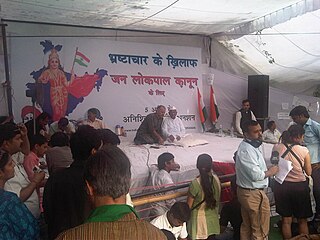 W
WThe Indian anti-corruption movement was a series of demonstrations and protests across India that began in 2011 and was intended to establish strong legislation and enforcement against perceived endemic political corruption. The movement was named as one of the "Top 10 News Stories of 2011" by Time magazine.
 W
WThe 2011 Iraqi protests came in the wake of the Tunisian revolution and 2011 Egyptian revolution. They resulted in at least 45 deaths, including at least 29 on 25 February 2011, the "Day of Rage".
 W
WThe anti-austerity movement in Ireland saw major demonstrations from 2008 to 2015.
 W
WThe 2011 Israeli social justice protests, which are also referred to by various other names in the media, were a series of demonstrations in Israel beginning in July 2011 involving hundreds of thousands of protesters from a variety of socio-economic and religious backgrounds opposing the continuing rise in the cost of living and the deterioration of public services such as health and education. A common rallying cry at the demonstrations was the chant; "The people demand social justice!".
 W
WThe Jordanian protests were a series of protests in Jordan that began in January 2011, and resulted in the firing of the cabinet ministers of the government. In its early phase, protests in Jordan were initially against unemployment, inflation, corruption. along with demanding for real constitutional monarchy and electoral reforms.
 W
WThe 2011 Lebanese protests, also known as the Intifada of Dignity or Uprising of Dignity were seen as influenced by the Arab Spring. The main protests focused on calls for political reform especially against confessionalism in Lebanon. The protests initiated in early 2011, and dimmed by the end of the year. In another aspect of the Arab Spring, Lebanese pro and anti-Assad factions descended into sectarian violence, which culminated in May–June 2012.
 W
WThe 2011 anti-cuts protest in London, also known as the March for the Alternative, was a demonstration held in central London on 26 March 2011. Organised by the Trades Union Congress (TUC), it was a protest march against planned public spending cuts by the Conservative-Liberal Democrat coalition government that was formed in May 2010.
 W
WThe 2011 Magallanes protests were a series of protests provoked by the rising of natural gas prices in the Chilean region of Magallanes, in January 2011. The conflict ended on January 18, when Laurence Golborne and the Citizens Assembly of Magallanes reached an agreement.
 W
WThe March of loyalty to martyrs was a protest on 22 February 2011 in Manama, Bahrain. Tens of thousands participated in the protest, one of the largest in the Bahraini uprising. Named after the seven victims killed by police and army forces during previous protests, the march filled the space between Bahrain mall and Pearl Roundabout. Protesters carried Bahrain's flag and demanded the fall of the government, implementation of a constitutional monarchy and other reforms, with some of them also demanding the end of the regime.
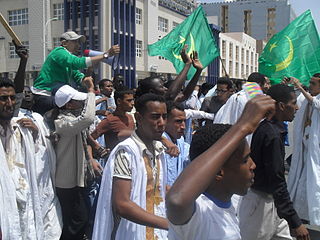 W
WThe 2011–2012 Mauritanian protests were a series of protests in Mauritania that started in January 2011, concurrent with the Arab Spring, and continued into 2012. The largely peaceful protest movement has demanded President Mohamed Ould Abdel Aziz institute political, economic, and legal reforms. Common themes of protest have included slavery, which is officially illegal in Mauritania, but is widespread in the country, and other human rights abuses the opposition has accused the government of perpetrating.
 W
WThe Moroccan protests are a series of demonstrations across Morocco which occurred from 20 February 2011 to the fall of 2012. They were inspired by other protests in the region. The protests were organized by the 20 February Movement.
 W
WOccupy Charlottesville was a social movement in Charlottesville, Virginia, United States, that began on October 15, 2011, in solidarity with Occupy Wall Street and the rest of the Occupy movement. The downtown Lee Park encampment was taken down on November 30, 2011, when 18 members of the movement were arrested and charged with trespassing. The group failed to establish a campsite after the eviction, although they continued to hold their 'General Assemblies' and participate in targeted actions for several months thereafter. The group's protests target social and economic injustice both locally and nationally.
 W
WOccupy Harvard was a student demonstration at Harvard University identifying itself with the global Occupy Movement. It sought to create a forum for discussing economic inequality at Harvard, in the United States, and throughout the world. It criticized Harvard's influence on global economic policy and its involvement with the American financial sector. It also supported wage campaigns by Harvard workers and a divestment demand initiated by Hotel Workers Rising.
 W
WThe Occupy movement was an international left-wing populist socio-political movement that expressed opposition to social and economic inequality and to the lack of "real democracy" around the world. It aimed primarily to advance social and economic justice and new forms of democracy. The movement has had many different scopes, since local groups often had different focuses, but its prime concerns included how large corporations control the world in a way that disproportionately benefits a minority, undermines democracy and causes instability.
 W
WOccupy Wall Street (OWS) was a protest movement against economic inequality and the influence of money in politics that began in Zuccotti Park, located in New York City's Wall Street financial district, in September 2011. It gave rise to the wider Occupy movement in the United States and other countries.
 W
WThe 2011 Omani protests were a series of protests in the Persian Gulf country of Oman that occurred as part of the revolutionary wave popularly known as the "Arab Spring".
 W
WOperation Anti-Security, also referred to as Operation AntiSec or #AntiSec, is a series of hacking attacks performed by members of the hacking group LulzSec and Anonymous, and others inspired by the announcement of the operation. LulzSec performed the earliest attacks of the operation, with the first against the Serious Organised Crime Agency on 20 June 2011. Soon after, the group released information taken from the servers of the Arizona Department of Public Safety; Anonymous would later release information from the same agency two more times. An offshoot of the group calling themselves LulzSecBrazil launched attacks on numerous websites belonging to the Government of Brazil and the energy company Petrobras. LulzSec claimed to retire as a group, but on 18 July they reconvened to hack into the websites of British newspapers The Sun and The Times, posting a fake news story of the death of the publication's owner Rupert Murdoch.
 W
WThe 12th March Movement or the Geração à Rasca protest took place in more than 10 cities of Portugal against the economic crisis and labour rights. They were the biggest events since the 1974 Carnation Revolution and organized without support from political parties or trades unions.
 W
WThe 2011–2013 protests in Sudan began in January 2011 as part of the Arab Spring regional protest movement. Unlike in other Arab countries, popular uprisings in Sudan had succeeded in toppling the government prior to the Arab Spring in 1964 and 1985. Demonstrations in Sudan however were less common throughout the summer of 2011, during which South Sudan seceded from Sudan, but resumed in force later that year and again in June 2012, shortly after the government passed its much criticized austerity plan.
 W
W"Putin Must Go" is a Russian website and public campaign organised for the collection of signatures to an open letter demanding the resignation of President Vladimir Putin. The campaign was started on the Internet on 10 March 2010 by Russian opposition activists, including several Russian artists.
 W
WThe 2011–2013 Russian protests, which some English language media referred to as the Snow Revolution, began in 2011 and continued into 2012 and 2013. The protests were motivated by claims by Russian and foreign journalists, political activists and members of the public that the election process was flawed. The Central Election Commission of Russia stated that only 11.5% of official reports of fraud could be confirmed as true.
 W
WThe protests in Saudi Arabia were part of the Arab Spring that started with the 2011 Tunisian revolution. Protests started with a self-immolation in Samtah and Jeddah street protests in late January 2011. Protests against anti-Shia discrimination followed in February and early March in Qatif, Hofuf, al-Awamiyah, and Riyadh. A Facebook organiser of a planned 11 March "Day of Rage", Faisal Ahmed Abdul-Ahad, was allegedly killed by Saudi security forces on 2 March, with several hundred people protesting in Qatif, Hofuf and al-Amawiyah on the day itself. Khaled al-Johani demonstrated alone in Riyadh, was interviewed by BBC Arabic Television, was detained in ʽUlaysha Prison, and became known online as "the only brave man in Saudi Arabia". Many protests over human rights took place in April 2011 in front of government ministry buildings in Riyadh, Ta'if and Tabuk and in January 2012 in Riyadh. In 2011, Nimr al-Nimr encouraged his supporters in nonviolent resistance.
 W
WSlutWalk is a transnational movement calling for an end to rape culture, including victim blaming and slut shaming of sexual assault victims. Specifically, participants protest against explaining or excusing rape by referring to any aspect of a woman's appearance. The rallies began on April 3, 2011, in Toronto, Ontario, Canada, after a Toronto Police officer suggested that "women should avoid dressing like sluts" as a precaution against sexual assault. Subsequent rallies have occurred globally.
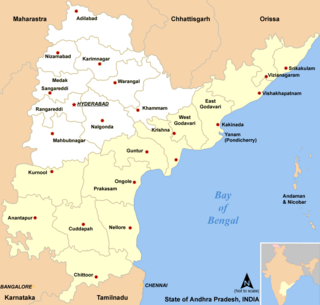 W
WThe early 2011 Telangana protests refers to a chain of events that took place during the early months of 2011, after the Srikrishna committee report was submitted to government of India. These protests are part of Telangana movement. The Telangana political JAC declared the launch of a non-cooperation movement throughout Telangana, including the state capital at Hyderabad, starting on 17 February. The plan was to request government employees not to work; people not to pay taxes or utility bills; people not to buy tickets while using public transport; to organise rallies; to block traffic on highways; and other measures. It is reported that Congress party's central leadership told Telangana MPs that it will take a decision on Telangana after assembly elections in several states in May. On 24 February, Telangana political JAC organised Egypt-like mass protests in Hyderabad beginning 10 March. Projections for number of people to be mobilised varied from one to five million. Protesters raised slogans of 'Jai Telangana', sang pro-Telangana songs, and played games. Protesters included activists of various political parties, students, government employees, lawyers, doctors, teachers, journalists, writers and cultural artists. 48 people were arrested for the vandalism of the statues. A Telangana leader said the incident show the hatred towards leaders of Andhra and he fears more such incidents if the central government further delays the process to carve out separate Telangana state. Osmania University students warned non-Telangana staff of the university to not pass on the identities of agitators to the police and warned them they could become targets if they did not join the agitation.
 W
WThe Late 2011 Telangana protests refers to a chain of protests as part of Telangana movement between September and December 2011. Sakala Janula samme or All peoples strike is the biggest protest of all. The strike lasted for over six weeks mainly affecting public services and local economy. On a call given by JAC, road blockades on national highways throughout Telangana, rail blockade and the strike of auto rikshaw union were organised on 24 and 25 September causing disruption in transport services. As the All People's strike entered the 30th day on 14 October 2011, Medak's MP Vijayashanti criticised the Congress high command for the delay in making the decision on Telangana and said Congress wants the issue to prolong until 2014. She further said the strike should continue until the formation of Telanana state. After 42 days, on 24 October, government employees unions called off the strike. Kodandaram said that the strike had impacted the overall thinking of the Centre towards creation of separate State and the movement will continue with other protest activities.
 W
WThe Mid 2011 Telangana protests refers to a chain of protests and mass resignations following the Million March incident in the Indian state of Andhra Pradesh. From April till June, the movement saw a lull, with different parties citing various reasons and fresh deadlines to renew the agitation. In July, 81 of 119 Telangana MLAs in the state, 12 out of 15 Telangana ministers in state, 13 out of 17 Telangana MPs in Lok Sabha, 1 Rajyasabha MP(Congress), 20 MLCs resigned protesting delay in the formation of Telangana. On 20 July, 30-year-old Yadi Reddy was found dead 100 yards from Parliament House in Delhi. An eight-page suicide note says the young driver from greater Hyderabad region of Telangana was upset over the government not creating a new state for his homeland. The speaker of the AP assembly on 23 July summarily rejected the resignations of all 101 MLAs citing that they were made in an emotionally surcharged atmosphere.
 W
WThe 2011 Tripoli clashes were a series of confrontations between Libyan anti-government demonstrators and forces loyal to Libyan leader Muammar Gaddafi in the capital city of Tripoli at the beginning of the Libyan Civil War. During the early days of the uprising, there was significant unrest in the city, but the city remained under the control of the government.
 W
WIn 2011, a series of rallies were held by Turkish Cypriots in North Nicosia against Turkey's policies on Cyprus.
 W
WThe anti-austerity movement in the United Kingdom saw major demonstrations throughout 2010s in response to Conservative-Liberal Democrat coalition government's austerity measures which saw significant reductions in local council budgets, increasing of university tuition fees and reduction of public spending on welfare, education, health and policing, among others. Anti-austerity protests became a prominent part of popular demonstrations across the 2010s, particularly the first half of the decade.
 W
WIn February 2011, a series of public employee protests began in the United States against proposed legislation which would weaken the power of labor unions. By March, eighteen states had proposed legislation which would remove some collective bargaining powers from unions, along with another five states which proposed legislation which would negatively affect unions. The protests occurred when public employee unions mounted protests against legislation proposed by Republican governors such as Scott Walker (Wisconsin), Rick Scott (Florida), Mitch Daniels (Indiana), Sean Parnell (Alaska), Rick Snyder (Michigan), John Kasich (Ohio), Paul LePage (Maine) and Jan Brewer (Arizona) which, among other things, would strip public employees of some collective bargaining rights as well as require higher employee contributions to pension and health care plans. The governors stated they needed these changes in order to cut state spending and balance the states' budgets. The protests began in Wisconsin, then spread to Indiana and Ohio, with unions around the country rallying to show their opposition to the proposed legislation. Several other states considered similar legislation. Virginia, North Carolina, and Texas prohibit formal collective bargaining with public employees.
 W
WThe 2011 Western Saharan protests began on 25 February 2011 as a reaction to the failure of police to prevent anti-Sahrawi looting in the city of Dakhla, Western Sahara, and blossomed into protests across the territory. They were related to the Gdeim Izik protest camp in Western Sahara established the previous fall, which had resulted in violence between Sahrawi activists and Moroccan security forces and supporters. The protests also purportedly drew inspiration from the Arab Spring and successful revolts in Tunisia and Egypt, though according to some commentators, the Arab Spring proper did not reach Western Sahara.
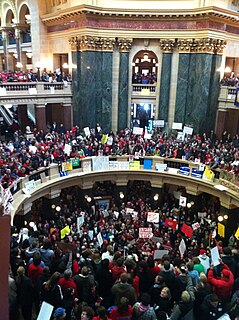 W
WThe 2011 Wisconsin protests were a series of demonstrations in the state of Wisconsin in the United States beginning in February involving at its zenith as many as 100,000 protesters opposing the 2011 Wisconsin Act 10, also called the "Wisconsin Budget Repair bill." The protests centered on the Wisconsin State Capitol in Madison, with satellite protests also occurring at other municipalities throughout the state. Demonstrations took place at various college campuses, including the University of Wisconsin–Madison and the University of Wisconsin–Milwaukee. After the collective bargaining bill was upheld by the Wisconsin Supreme Court on June 14, the number of protesters declined to about 1,000 within a couple days.
 W
WThe Yemeni Revolution (intifada), also known as the Yemeni Revolution of Dignity followed the initial stages of the Tunisian Revolution and occurred simultaneously with the Egyptian Revolution of 2011 and other Arab Spring protests in the Middle East and North Africa. In its early phase, protests in Yemen were initially against unemployment, economic conditions and corruption, as well as against the government's proposals to modify Yemen's constitution. The protesters' demands then escalated to calls for the resignation of Yemeni President Ali Abdullah Saleh. Mass defections from the military, as well as from Saleh's government, effectively rendered much of the country outside of the government's control, and protesters vowed to defy its authority.